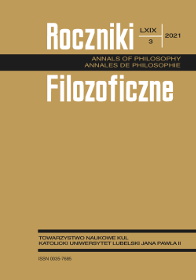“You Would Not Seek Me If You Had Not Found Me”—Another Pascalian Response to the Problem of Divine Hiddenness
Abstract
One version of the Problem of Divine Hiddenness is about people who are looking for God and are distressed about not finding him. Having in mind such distressed God-seekers, Blaise Pascal imagined Jesus telling them the following: “Take comfort; you would not seek me if you had not found me.” This is what I call the Pascalian Conditional of Hiddenness (PCH). In the first part of this paper, I argue that the PCH leads to a new interpretation of Pascal’s own response to the problem, significantly different from Hick’s or Schellenberg’s interpretations of Pascal. In short: for any person who is distressed about not finding God, and who (for this reason) seriously considers the Argument from Hiddenness, the PCH would show that their own distress constitutes evidence that God is in fact not hidden to them (because this desire for God has been instigated in them by God himself). In the second part of the paper, I set aside the exegetical question and try to develop this original strategy as a contemporary response to one version of the Problem of Divine Hiddenness, which I call the “first-person problem.” I argue that the PCH strategy offers a plausibly actual story to respond to the first-person problem. As a result, even if we need to complement the PCH strategy with other more traditional strategies (in order to respond to other versions of the problem), the PCH strategy should plausibly be part of the complete true story about Divine Hiddenness.
References
Adams, Robert Merrihew. The Virtue of Faith and Other Essays in Philosophical Theory. New York: Oxford University Press, 1987.
Anderson, James. Paradox in Christian Theology: An Analysis of Its Presence, Character, and Epistemic Status. Carlisle: Paternoster Press, 2007.
Aquinas, Thomas. Summa Contra Gentiles. Translated by Vernon Joseph Bourke. Notre Dame, IN: University of Notre Dame Press, 2001.
Benedict XVI. Homily for the Mass of the Lord’s Supper, 21 April 2011. Vatican City: Libreria Editrice Vaticana, 2011. Accessed May 4, 2021. http://www.vatican.va/content/benedict-xvi/en/homilies/2011/documents/hf_ben-xvi_hom_20110421_coena-domini.html.
Bernard. “Sermon XIII for the Advent Season.” In No Uncertain Sound, Sermons That Shaped the Pulpit Tradition, edited by Ray C. Petry, 143–67. Philadelphia: Westminster Press, 1948.
Bernard. On Loving God. Text version made available online by Paul Halsall. Generic NL Freebook Publisher. Accessed May 2, 2021. https://www.ccel.org/ccel/bernard/loving_god/loving_god.ix.html.
Gregory. “Homily 30.” In Homilies on the Gospels, Patristic Bible Commentary. Accessed March 31, 2021. https://sites.google.com/site/aquinasstudybible/home/gospel-of-john-commentary/gregory-the-great-homily-30-on-the-gospels.
Hick, John. Faith and knowledge. London: Macmillan, 1967.
Howard-Snyder, Daniel, and Adam Green. “Hiddenness of God.” In The Stanford Encyclopedia of Philosophy (Winter 2016), edited by Edward N. Zalta. https://plato.stanford.edu/archives/win2016/entries/divine-hiddenness.
Lecuit, Jean-Baptiste. Le désir de Dieu pour l’homme: une réponse au problème de l’indifférence, 2017.
Leduc-Fayette, Denise. Pascal et le mystère du mal: la clef de Job. Paris: Cerf, 1996.
Lewis, Clive Staples. Mere Christianity : A Revised and Amplified Edition, with a New Introduction, of the Three Books, Broadcast Talks, Christian Behaviour, and Beyond Personality. San Francisco: Harpe, 2001.
Michon, Cyrille. “Is Atheism (the Fact) Good Evidence for Atheism (the Thesis)? On John Schellenberg’s Argument from Ignorance.” European Journal for Philosophy of Religion 7, no. 1 (2015): 71–88.
Nagel, Thomas. “Sexual Perversion.” The Journal of Philosophy 66, no. 1 (1969): 5–17. https:// doi.org/10.2307/2024152.
Nazianzen, Gregory. “Oration 40: The Oration on Holy Baptism.” Translated by Charles Gordon Browne and James Edward Swallow. New Advent. Accessed May 4, 2021. https:// www.newadvent.org/fathers/310240.htm.
Pascal, Blaise. Pensées. Translated and edited by A. J. Krailsheimer. London: Penguin Books, 1966.
Poston, Ted, and Trent Dougherty. “Divine Hiddenness and the Nature of Belief.” Religious Studies 43 (2007): 183–98.
Rahner, Karl. “Anonymous Christians.” Theological Investigations 6 (1969): 390–98.
Rea, Michael. The Hiddenness of God. Oxford: Oxford University Press, 2018.
Schellenberg, J. L. Divine Hiddenness and Human Reason. Ithaca, NY: Cornell University Press, 1993.
Schellenberg, J. L. “On Not Unnecessarily Darkening the Glass: A Reply to Poston and Dougherty.” Religious Studies (2007): 199–204.
Schellenberg, J. L. The Wisdom to Doubt: A Justification of Religious Skepticism. Ithaca, NY: Cornell University Press, 2007.
Swinburne, Richard. Providence and the Problem of Evil. Oxford: Clarendon Press, 1998.
Copyright (c) 2021 Roczniki Filozoficzne

This work is licensed under a Creative Commons Attribution-NonCommercial-NoDerivatives 4.0 International License.





